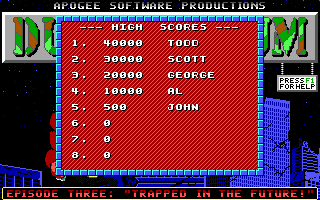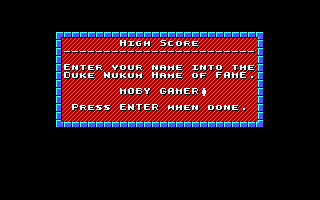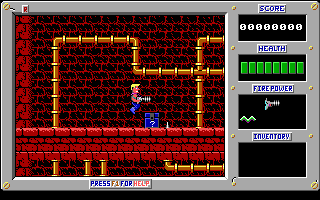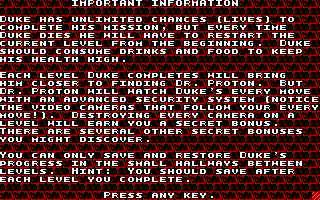Retro Replay Review
Gameplay
Duke Nukum: Episode 3 – Trapped in the Future leans heavily into classic side-scrolling shooter mechanics, blending fast-paced gunplay with precision platforming. Players guide Duke through sprawling, multi-tiered levels where reflexes and route-finding are equally important. Enemies are varied—from nimble Techbot scouts to hulking mechanical sentries—forcing you to constantly switch between evasive maneuvers and full-bore assaults. The controls feel tight and responsive, with jump arcs and weapon swaps happening instantly when you need them most.
(HEY YOU!! We hope you enjoy! We try not to run ads. So basically, this is a very expensive hobby running this site. Please consider joining us for updates, forums, and more. Network w/ us to make some cash or friends while retro gaming, and you can win some free retro games for posting. Okay, carry on 👍)
One of the standout features is the destructible environment. Whether you’re blasting through metal grates to uncover hidden paths or demolishing crates for extra health packs and weapon upgrades, the world feels malleable under Duke’s shotgun blast. This interactivity adds a layer of exploration: not every wall is a barrier, and not every floor is stable. Experimenting with explosives and line-of-sight attacks becomes a rewarding puzzle in itself.
Progression is driven by collectible power-ups and performance bonuses. Health packs, shield boosts, and temporary weapon mods keep you on your toes, while special inventory items—like the time-freeze grenade or the magnetic mine—open up new tactical possibilities. At the end of each level, the game tallies bonus points for feats such as destroying all security cameras or clearing rooms within a time limit. This scoring system encourages replayability, as you strive to perfect each stage and unlock hidden areas on subsequent runs.
Graphics
Visually, Episode 3 builds on the legacy of Crystal Caves’ polished pixel art, pushing color depth and sprite detail to their furthest limits on the same engine. Backgrounds are layered with neon-lit cityscapes, crumbling acid-pools, and mechanical factories humming with robotic life. The palette highlights a dystopian future drenched in purples and electric blues, evoking both the grit and high technology of Dr. Proton’s fortress.
Character and enemy sprites are highly readable, even when you’re locked in a firefight with a half-dozen Techbots. Each enemy type has a distinct silhouette, which helps you prioritize targets on the fly. Environmental hazards—such as conveyor belts, crushing presses, and laser barriers—flash warning cues before activation, giving you a fair chance to react. Special effect animations, from rocket trails to energy bursts, are crisp and never bog down the frame rate.
Although the game’s 2D visuals might feel retro by modern standards, the attention to detail compensates for any lack of polygonal polish. Animations are smooth, transitions between areas are seamless, and destructible elements leave behind debris that stays lithely on screen. The overall presentation feels like a love letter to early ’90s PC gaming, updated with sharper resolutions and richer color cycling.
Story
In the year 1997, Dr. Proton’s Techbots brought the world to its knees—and now, in the far future of Episode 3, his mechanical empire is unchallenged. Duke Nukum awakens in a high-security holding cell, stripped of his usual arsenal and attitude, and must claw his way back to full strength before even thinking about stopping the mad scientist. The premise is simple, but it delivers enough narrative hooks to keep you invested across multiple levels.
Storytelling unfolds through brief cutscenes and in-game dialogue between Duke and a shadowy resistance network. While the writing leans into campy one-liners—“Time to punch some circuits!”—it never slips into parody. Instead, it complements the game’s breakneck pace, offering just enough context to justify your rampage through mechanical hives and security bunkers. Key plot beats are highlighted by atmospheric changes, from dimly lit data centers to Proton’s gleaming command citadel.
As you progress, you’ll occasionally find data logs and secret terminals that hint at Dr. Proton’s true ambitions and the personal costs of this time-twisting war. These optional tidbits flesh out the lore without bogging down the action. By the final showdown, you have a clear sense of why Duke’s mission matters—both for global freedom and for his own brand of heroics.
Overall Experience
Duke Nukum: Episode 3 – Trapped in the Future delivers a quintessential retro-shooter experience, successfully updating a proven formula for modern audiences. The blend of tight controls, destructible terrain, and varied enemy encounters keeps each level fresh, while the scoring system and hidden bonuses encourage repeated plays. Even novice players can breeze through the early stages, but achieving 100% completion demands patience and skill.
Graphically, the game stands out among its peers, turning familiar pixel art into a vibrant, futuristic playground. The audio design—complete with throbbing synth tracks and explosive SFX—drives the adrenaline home. Story elements, though straightforward, maintain momentum and reward curiosity without ever slowing down the core gameplay loop.
Whether you’re a veteran of classic PC shooters or simply craving a no-nonsense action platformer, Duke Nukum: Episode 3 offers a hefty dose of satisfying gunfire and environmental chaos. It caps off the trilogy in style, giving fans a proper showdown with Dr. Proton and newcomers a clear path to mechanical destruction. Strap in, lock and load, and prepare to be trapped—in the best possible way—in the future.
 Retro Replay Retro Replay gaming reviews, news, emulation, geek stuff and more!
Retro Replay Retro Replay gaming reviews, news, emulation, geek stuff and more!








Reviews
There are no reviews yet.